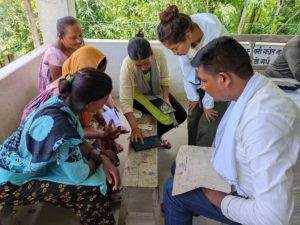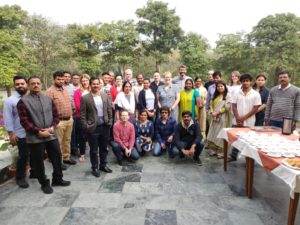Authors: Mirianna Budimir and Anna Svensson
At Practical Action, we work in partnerships with some of the world’s leading institutes and researchers to better understand the science behind disasters and use this understanding to reduce risk faced by the communities we work with. To these partnerships we have brought decades of experience developing low-cost, community centred flood early warning systems (EWS), in-depth experience from implementing programmes with communities particularly in Peru and South Asia, relationships with key stakeholders and a strong understanding of the enabling environment these systems operate within.
Research partnerships for global impact on disaster risk
One of the largest partnerships we’ve contributed to recently is SHEAR, or Science for Humanitarian Emergencies and Resilience Programme, a five-year programme funded by the FCDO and UKRI-NERC. Together with the Red Cross Red Crescent Climate Centre, Practical Action took on the role of knowledge broker for the whole programme, facilitating knowledge exchanges and collating and disseminating lessons learned throughout 100 research projects delivered by practitioners, researchers, and scientists from more than 70 different institutions.
Within the SHEAR programme Practical Action was a research partner in the LANDSLIP project, working with an interdisciplinary team led by King’s College London and the British Geological Survey across multiple countries and sectors to collectively develop and pilot a prototype regional landslide forecasting system for district authorities in India.
Another global research programme we have partnered with is Tomorrow’s Cities, aimed at reducing disaster risk for the urban poor, including in Nepal’s capital Kathmandu where we work together with researchers from University of Edinburgh, University of Glasgow, UK Met Office and NDRI to better understand hazard risks under current and future climate scenarios.

Farmers enrolling in index based flood insurance scheme
Working together with UK universities for innovative resilience approaches
Over the past years we have partnered with several British universities on a wide range of projects. Together with interdisciplinary teams from University of Edinburgh and University of Durham, we have been conducting innovative research in the Karnali River Basin in Western Nepal to enhance understanding of the flood risk posed to communities and understand how geomorphology and rainfall patterns change the riverine landscape.
In 2016 we worked in Nepal together with researchers from Lancaster University and Water Numbers to develop and pilot a low data approach to provide probabilistic forecasts which have increased early warning lead times from 2-3 hours to 7-8 hours.
Practical Action has been working with Imperial College London to test out new, low-cost, LiDAR sensors in Nepal and Peru to improve early warning systems. These sensors directly address challenges Practical Action has experienced in the communities we work with. The technology improves access to timely, understandable and locally specific flood early warning, saving lives and livelihoods.
We’ve worked with Durham University, Institute of Hazard Risk and Resilience to understand the fundamentals for an appropriate risk transfers mechanism for poor farmers in Nepal.
We have been working with universities like Coventry University, Loughborough University, Newcastle University, and the University of Edinburgh through multiple projects to understand the opportunities and barriers to the access and use of energy sources and products in the face of disaster and climate change-related impacts.
We have also worked with students from universities like the London School of Economics and Political Science on topics like disability transformative Early Warning Systems, energy sources and mobile connectivity for EWS in remote mountainous contexts, and race, ethnicity and class in EWS.

Mobile Flood Alerts from DHM
Areas where we are keen to learn more
Through our research and work together with communities we are continuously coming across new challenges to building community disaster resilience. Challenges we are keen to tackle through interdisciplinary partnerships with the brightest minds in disaster research. Below are some examples of areas where we are working and the research questions this work is bringing up.
Multi-hazard Early Warning Systems: Often WS operate in silos, focusing on single hazard types. This can result in confusing, contradictory and inconsistent information for people who are trying to make decisions during emerging crises. We are interested in better understanding what (if any) emerging operational multi-hazard early warning systems exist, what can be learned from these and what gaps remain in multi-hazard EWS development.
Eco-DRR approaches: Based on the potential that Nature Based Solutions and Eco-DRR approaches have for reducing risks from floods and landslides we are interested in understanding what practices and strategies to do so exist and what can be learned from these, including around their effectiveness and how to ensure uptake in formal planning processes.
Energy access powering climate change adaptation: We recognise that more empirical evidence is needed to improve the design of policies and programmes linking energy access and climate change adaptation. We would like to better understand to what extent different energy access levels and uses translate into greater resilience in specific community contexts and to what extent this is dependent on other factors such as community dynamics, livelihood types and energy technology affordability and resilience.
Are you the right partner for Practical Action?
We are looking for researchers and institutions interested in partnering with Practical Action to collaborate on research to address the disaster risk and climate change impact challenges facing communities we work with.

The LANDSLIP research team
Get in touch about potential collaborations
Author bios:
Mirianna Budimir
Dr Mirianna Budimir is the Senior Climate and Resilience Expert in Practical Action. Her work at Practical Action includes improving the science-practice interface on topics such as disasters, early warning services, end-mile communication, gender, and international development.
Anna Svensson
Anna is the Senior External and Engagement Officer at Practical Action. She leads, creates, and delivers campaigns and opportunities to promote and disseminate Practical Action’s experience, expertise, and knowledge to scale our impact.